Match Guilt
I’m feel I should be beating the drum more loudly for Woody Allen’s Match Point (DreamWorks, 12.28) because it’s not just his best in a long time, but one of the best of the year. And I need to stop being wimpy about this.
It really is Allen’s darkest and most precisely calibrated film since Crime and Misdemeanors…clean, cruel and ironic as hell.
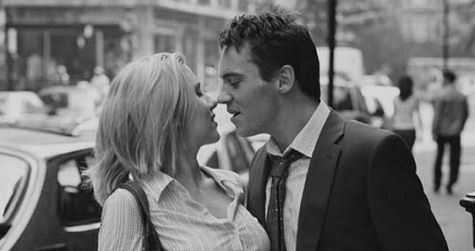
Scarlett Johansson, Jonathan Rhys-Meyers in Woody Allen’s Match Point
Any film worth its salt has to have thematic clarity. Match Point‘s theme is clear as a friggin’ bell, and with echoes of George Stevens’ A Place in the Sun and Fyodor Dostoevsky’s “Crime and Punishment,” and it boils down to this:
Be smart and vigilant in life, and maybe you’ll get what you want, or what you think you need. But if you want things to really turn out, be lucky.
< ?php include ('/home/hollyw9/public_html/wired'); ?>
People hate this notion because it means our lives are little silver balls whirling around a roulette wheel. Maybe we’ll plop into a red or black slot at the right time, or into an odd or even number at the wrong time…and maybe something amazing or comical or devastating will come of it. Life is cold, man.
If there wasn’t such a herd mentality in this town, if people weren’t so political and equivocal, Match Point could actually be in the mix for Best Picture.
It’s a slightly better film than Good Night, and Good Luck. It’s not as much of a sad and broken-hearted thing as Brokeback Mountain, but it has as much confidence and self-awareness as Walk the Line. And it’s a good five or ten times better than Memoirs of a Geisha.
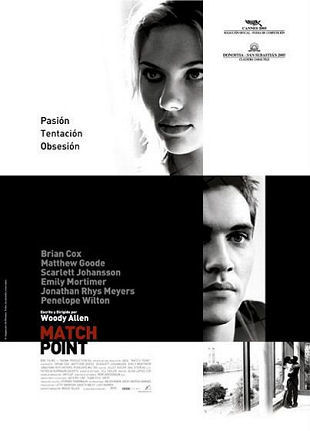
The Spanish one-sheet, which, if you ask me, has it all over the U.S. version
Let’s be really honest. I’m not ballsy enough to stand up for the Woody all alone, partly because deep down I’m only 90% supportive of Match Point (I have some problems with this and that aspect, but nothing humungous), but I feel bolder with Oscar prognosticators Pete Hammond, Sasha Stone and Eugene Hernandez listing it among their top five.
So I guess I’m like Bobby Kennedy after Eugene McCarthy got 42% of the vote in the 1968 New Hampshire primary against Lyndon Johnson. I’m going, “Uhh, okay …there’s something happening here and I’m joining the insurrectionists.”
Screw the herd mentality and the hell with political and equivocal. The more I think about Match Point, the better it seems. Woody’s easily a Best Original Screenplay contender, and…well, at least that.
I said last May at the Cannes Film Festival that Match Point isn’t quite as good as Woody’s Crimes and Misdemeanors, but it deals the same kind of cards and has its footing in more or less the same philosophical realm.
And I’ve said this three or four times, but the finale kills.
Set in present-day England (mostly London, Match Point is about a tennis instruc- tor namd Chris Wilton (Jonathan Rhys- Meyers) who relationships his way into an upper-crust English family by way of one of his male students, a cheerful smoothie named Tom Hewett (Matthew Goode).
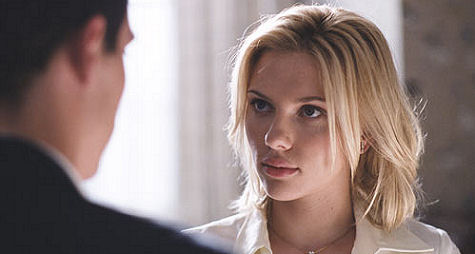
Chris is soon romancing and then marrying Tom’s sister Chloe (Emily Mortimer), but almost-as-quickly getting involved with Tom’s fiance, a struggling American actress named Nola Rice (Scarlett Johansson).
The story essentially turns on the matter of Nola becoming pregnant and insisting that Chris leave his wife for her, and how Chris deals with the pressure of this.
Rhys-Meyers handles his part skillfully and with exactly the right balance between terrible, gut-wrenching guilt and the suggestion of a sociopathic undercurrent. But it’s Johansson, far and away, who gives the finest performance. She seems in possession of a fierce, almost Brando-esque naturalism here. She grabs Allen’s dialogue by the shirt collar and slaps it around.
Match Point feels a bit pat from time to time. The talk feels a little too polite here and there, and certain aspects of the plot feel a bit forced. But that’s Woody these days, and in this instance, in this realm, that’s pretty damn good.
Sense of Gravity
Do today’s African-American actors radiate a graver, weightier aura…a stronger sense of manly conviction than white actors these days? Do they seem more rooted, less whimsical…more dependably earnest?
Or has it always been this way and white-guy columnists like myself are only just waking up to this? Or is the whole idea bogus and agenda-driven?
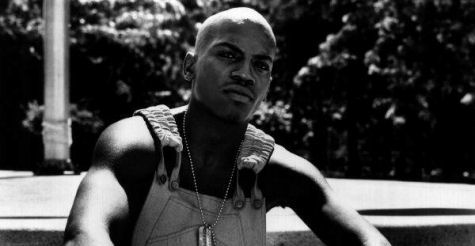
Would Mekhi Phifer have been better as Ennis del Mar or Jack Twist?
I got started on this theory when a New York-area guy named Richard Szathmary suggested this morning that if two black actors — Mekhi Phifer and Sharif Atkins, say — had played the kissin’ cowboys in Ang Lee’s Brokeback Mountain (Focus Features, 12.9) that reactions among younger-male heteros might be less squea- mish.
I’m referring to under-25s in both Flyover Country and in the big cities guffawing derisively at the film’s teaser-trailer. (I really hate bringing up this asinine reaction, but I’ve been told about it time and again.)
The feeling is that Atkins and Phifer falling for each other would somehow seem more solemn and steady and take-it-to-the-bank.
That’s how it seems to Szathmary, at least…a guy who hasn’t seen seen Brokeback Mountain but has his suspicions based on the trailer…a notion that there’s something vaguely flakey and untrustworthy about Jake Gyllenhaal and Heath Ledger. Something in their eyes, manner…something deep down.
I’ve seen Brokeback and I completely disagree. Ledger and Gyllenhaal totally inhabit their characters and then some, revving their emotional engines to a high pitch.
It wouldn’t have quite worked, in any case, to have a couple of black actors playing sheepherders-for-hire in a film that begins in the early ’60s, given the relatively few people of color known to have worked the open range forty or forty-five years agi, not to mention the conservative-racist mentality of big-time ranchers back then.
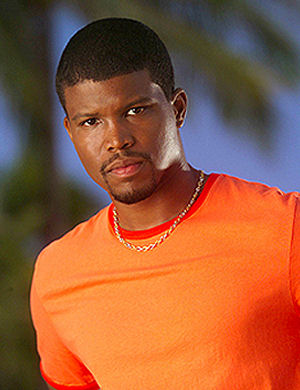
Sharif Atkins
And I can’t help wondering if Ang Lee and James Schamus would have been able to find a pair of marquee-worthy black actors if they’d said “Fine, let’s cast it this way.” The machismo factor among African-American actors is thought to be pretty high. Remember Will Smith’s reaction to briefly kissing a guy in Six Degrees of Separation?
But maybe Szathmary is onto something anyway.
The more I think about these guys and whatever that thing is they seem to possess, the more solid this idea seems.
I’m thinking of a list that includes (but certainly isn’t limited to) Terrence Howard, Don Cheadle, Denzel Washington, Mos Def, Jamie Foxx, Samuel L. Jackson, Phifer, Taye Diggs, Ludacris, Delroy Lindo, Bill Duke, Ving Rhames, Atkins, Ice Cube, Lawrence Fishburne, Sean Patrick Thomas, Henry Simmons, Keith Hamilton Cobb.
I could even include even Sean Combs, whom I believed as a death-row inmate in Monster’s Ball, despite his not being much of an actor.
“The American cinema is dominated by commanding black males,” wrote Szathmary. “Men whom one can picture as real men. Guys who don’t whine and have real voices and calmly and capably make their moves and get things done.”
As the risk of sounding like a cultural bubble-dweller or zombie of some kind, there’s something to this view. A feeling that there’s something more dependable and rock-solid about black guys…except when it comes to Martin Lawrence, the dandified Will Smith and that guy who played the sick-fuck Little Ze in City of God.
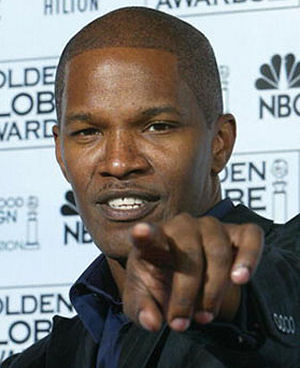
Jamie Foxx
At the same time the notion that guys with darker skin have it all over guys of European heritage sounds simplistic and dumb-assed.
On the other hand there was a voice inside me that said “cool” when that fast-flurry rumor popped up last year about Colin Salmon being one of the finalists being tapped to play 007.
I could riff some more about about this and call up ten or fifteen producers, agents and casting directors and chew it over with them, but let’s just throw this one out and get some reader reactions.
Joan and Toni
L.A. City Beat film critic Andy Klein came on “Elsewhere Live” last night (i.e., Thursday) to talk about the leading Best Actress contenders, and all the verbal sifting-through led me to realize something I hadn’t quite come to on my own:
The two finest waker-upper female performances of the year are both underdogs. One isn’t being spoken of very much, and the other isn’t even on the map.
I’m speaking of Joan Allen’s alcoholic, emotionally off-balance mother of four girls in Mike Binder’s The Upside of Anger and Toni Collette’s stressed, hurting, buoy- ant Philadelphia attorney in Curtis Hanson’s In Her Shoes.
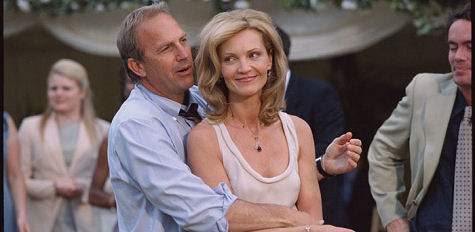
Kevin Costner, Joan Allen in The Upside of Anger
Allen is sitting on a few Oscar prognosticator “maybe” lists, but not so you’d notice. It’s high time to refresh the browser. There’s an emotional hair-trigger element that Allen gets hold of in Anger that feels almost giddy at times. She’s bracing and sexy, willful and vulnerable and quirky. (And let’s not forget how sublime she was in Sally Potter’s Yes.)
No one anywhere is talking about Collette at all. Obviously people disagree with my feelings about her. Maybe In Her Shoes getting only a 75% positive rating on Rotten Tomatoes had its effect, and maybe the underwhelming box office was a factor, or Fox not going to bat for Collette with trade ads…whatever.
I know what exceptional in-the-pocket acting is — I know what it feels like, sounds like — and I know plenty of others who feel this way, and those who’ve dismissed Collette’s performance out-of-hand are just being slackers.
Allen and Collette’s performances are funny, sad, joyful, exuberant. They raise the emotional thermometer and have all kinds of ins and outs, and the plain simple truth is that none of the other supposed contenders (i.e., the ones on everyone’s lists) are in their realm.
I believe this because…
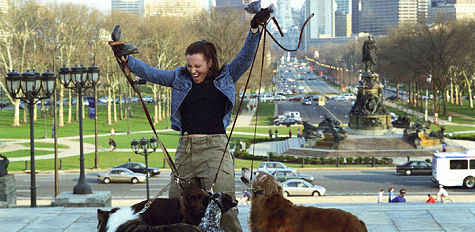
Toni Collette in In Her Shoes
Reason #1: Reese Witherspoon, the presumed front-runner for her fine inhabiting of June Carter in Walk the Line, gives an assured movie-star performance…yes. Her acting is robust and and authentically down-home. She does more with less and is quite radiant and likable, and she sings like an angel. And she’s almost a supporting character (I said “almost”). And she doesn’t have one of those hair- pulling, “look ma, I’m acting” scenes to work with either.
But at the same time Witherspoon isn’t exactly pushing her boundaries or rewriting the book on acting. She’s great but c’mon…
Reason #2: Judi Dench, another presumed front-runner for her playing a spirited upper-class snob in Mrs. Henderson Presents, can do this sort of thing in her sleep. Academy people always kowtow to world-class British actresses when they get hold of a good part, and that’s happening here. Like I said a few weeks ago, Dench “has a pitch-perfect way of delivering zap lines with just the right tone of upper-class indifference, and yet the joke is always on her.” But it’s a performance that’s straight out of her kit bag.
Reason #3: Sarah Jessica Parker is the one who goes through the big character journey in The Family Stone, starting out all rigid and butt-plugged and then evol- ving into somone calmer and more centered. But she’s not in Witherspoon’s class, much less Allen’s or Collette’s (in part because of how her character is written).
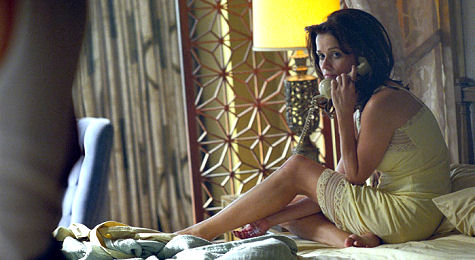
Reese Witehspoon in Walk the Line
Reason #4: Charlize Theron gives an impassioned, balls-out, tough-as-nails performance in North Country, but the movie, a fairly solid drama on its own terms, didn’t cause much of a stir when it came out, and people feel a little Charlize-d out from the Monster hoopla of…what was it, two years ago?
Reason #5: This is a non-reason, but I haven’t seen Felicity Huffman playing a man undergoing a gender-switch procedure in Transamerica, so she’s off the table for now.
Reason #6: Keira Knightley doesn’t have that element of a-churning-river-running- through-her…not at all…not in Pride & Prejudice, and not in any performance she’s given in any film so far. It’s vaguely silly that people have even put her on their lists. Just forget it.
Reason #7: Ziyi Zhang is a barely emotive presence in Memoirs of a Geisha. She’s all makeup and porcelain and dropping her gaze to the ground. She’s young and vigorous and great on her feet with a sword, but quiet acting isn’t her game. She may get swept along in the current of all the below-the-line nominations that Geisha is expected to receive, but she doesn’t deliver on her own and that’s a fact.
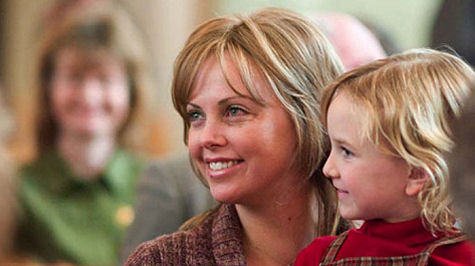
Charlize Theron in North Country
Reason #8: Claire Danes doesn’t have nearly enough to work with in Shopgirl, and her character’s a bit opaque and the movie’s underwhelming, so forget it.
Reason #9: Gwyneth Paltrow’s daughter-of-Anthony-Hopkins character in Proof is too gloomy and self-involved. That was my reaction, at least — I felt she was too wrapped up in her woe-is-me blanket, and I found that off-putting after a while. The film has its moments and Paltrow’s performance has merit, but it’s a stretch to talk about Oscar contention.
Reason #10: The White Countess is said to have more than a few problems so however good Natasha Richardson may be, a nomination doesn’t seem to be in the cards.
Reason #11: It’s a little early to say anything, but the word around the campfire is that the same equation may apply to notions of Q’orianka Kilcher being singled out for her work in The New World.
I said no other female performance this year was quite in Allen and Collette’s realm. That isn’t entirely accurate if you allow Robin Wright Penn’s brief but startling turn in Rodrigo Garcia’s Nine Lives into the mix.
Wright Penn may not be on-screen long enough to qualify for contention in the Best Supporting Actress category (in people’s heads, I mean) but she’s absolutely mesmerizing in this film. I wrote about it in October (scroll to the bottom of the page).
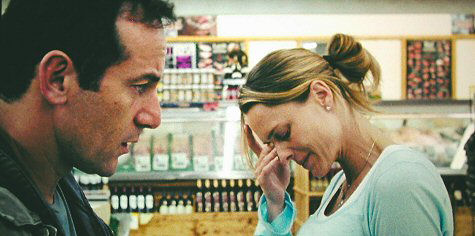
Jason Isaacs, Robin Wright Penn in Nine Lives
Forget It
Forget that whole Sundance Film Festival ’06 thing I posted in this section a few days ago, and in the main column last Saturday. Almost all of it was wrong and that’s that.
I’ve been reliably persuaded that a good portion of the titles I mentioned won’t be at the festival, and that some weren’t even submitted (!).
Five or six days ago a friend from the festival circuit sent me a document put together by Film Finders called “Tipped for Sundance,” and it had those 22 films listed.
I went for the information because (a) the Film Finders people are known to be fairly well connected on a business affairs level, (b) the document was passed along only a few days before the official announcements (the trades will be running the stories this week), (c) the document “looked” superficially reliable — it had production info history, sales contact info and phone numbers for each film — and (d) the combined reptutations of Film Finders and the guy who sent me the document convinced me the information was probably jake.
And for the most part, it wasn’t.
Fist in the Air
“I finally got a chance to catch Rent yesterday and wanted to let you that your review in your 11.9 column absolutely nailed it. Columbus did a helluva job transferring this thing to the screen and I agree it worked better in many ways than the play.
“Film allows the viewer to peer deep into its characters souls in a way that the stage (for all its vitality) cannot, and Columbus’s choices were excellent. He let the music speak for itself and didn√ɬ¢√¢‚Äö¬¨√¢‚Äû¬¢t let his ego or pretensions get in the way of telling the story.
“I can’t help but think that a more auteur-type (Martin Scorsese and Spike Lee were both attached at one time) would be more inclined to put a personal spin on the material, and thus dilute the essence of Larson’s music. The ego-less direction from Columbis lets the source material to shine through.
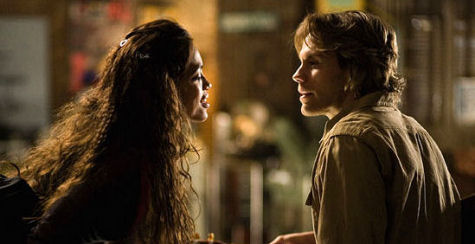
Rosario Dawson, Adam Pascal in Rent
“Like many others, I find myself caught in a daily grind of trying to move forth and survive in life’s scramble. Rent reminded me of how important prioritization is. When Rosario Dawson sings to Adam Pascal about how ‘life is yours to miss’ …damn, it hit hard.
“Rent reminded me of why I love art and the way it can help affirm why we’re all here.
“I think many critics are down on this thing due to an anti-Columbus bias (which I previously shared), or they just didn’t enjoy the style, music, etc. They’re missing the boat. This film is much better than Chicago and has an emotional immediacy that is heartfelt and pure.
“So three cheers for Rent and your standing-by-what-you-saw review. It’s another reason why I will remain a loyal reader of your column.” — Kyle Fredette
Brokebackers
“In the Twin Cities where I live, the Brokeback Mountain trailer has been getting lots of snickers at cineplexes and Landmark chain theaters alike. I’m no homo- phobe, and I’m a big Ang Lee fan who will be seeing Brokeback the weekend it opens here. But the collective reaction in some of these theaters has been really something.
“People openly laugh at Heath Ledger’s line ‘Why can’t I quit you?’ A very liberal friend of mine has even taken to doing his own impression of Ledger saying that line, to the howls of all of our other friends.
“While Ledger is very talented and deserves more respect than he gets, I think the idea of the star of A Knight’s Tale uttering that line is hitting people as utterly ridiculous. The line is going to be the thing that most people think of when they think of this movie. Watch over the coming months as it becomes a catchphrase.
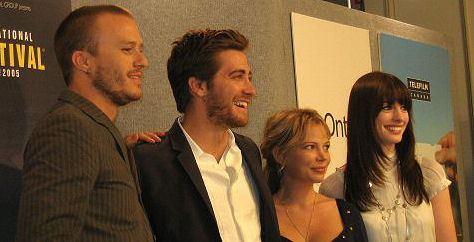
“I’m looking forward to this movie and I’m sure it will be deserving of/in contention for numerous awards. But I expect it’s going to get quite a beating from the mass culture, in the way The Crying Game did. I hope I can find a showing in a theater on opening weekend that isn’t ruined by laughter.” — Brian Roche
“I am a 20-something woman, and James Shamus is right, as he usually is about these things, that women like me are the target audience for Brokeback Mountain, and I will be there as soon as it opens here in DC.
“But whenever I bring up BBM to any heterosexual male under 30 I just get the ‘independent films are all about gay cowboys eating pudding’ thing from South Park. These men are well-educated and enjoy independent film. And I don’t think there is so much of a cringe factor as one might think for these young-ish men watching two dudes in love. I just do not think that is the problem.
“As much as I love South Park (and personally think that their characterization of independent film is quite funny), I have to blame Matt and Trey for the chortle and giggle factor that I have run into. However, I also think that if these men got their asses into the seats and watched the film I think most of them would enjoy it. But please, take me with a huge grain of salt as I really liked Ang Lee’s The Hulk.” — Haley Aurora
“Okay, message received: Jeffrey Wells is full-steam behind Brokeback Mountain as the film of the year. Groovy. And your worries about a bubba backlash against it, spurred by homophobia, are entirely realistic and well-founded.
“But with respect, is it possible you’re overlooking the other side of the coin here?
“What I mean is, if one is going to be upfront about the fact that there will be people who will skip this movie, dump on this movie, refuse to like or admit liking this movie because of what side they take in the moral debate over gay rights…is it not only fair but simply intellectually honest to also concede that there will be people who will reflexively praise and exalt it, without having seen it because they take the opposite side and want to see a gay-themed movie succeed?
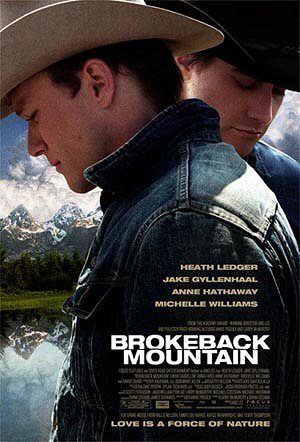
“I’m not accusing you of outright bias. You’ve seen the film, it’s obviously gotten to you in a profound way, and you’re convinced of it’s innate quality. But if it’s going to be fair-game (and I believe it ought to be) to read between the lines of negative reviews and question whether an element of homophobia is clouding the reviewer’s decision, would you not agree that it’s equally fair-game to do the same for the positive reviews?
“Not every critic is going to agree that this is a great or even good film. But how many of them will be, you’ll pardon the expression, bending over backwards to be positive about it for fear of appearing in cahoots with the religious right wackjobs who will probably be trashing it?
“I’m from Massachusetts and am regularly in the social company of various gay, bisexual or otherwise pals. I’ve supported just about every gay rights cause that’s come down the pike. I’m a full-bore enemy of religious fundamentalism in all it’s forms. I want to see a serious gay-themed movie make a mainstream impact to help society grow up a bit over the whole issue…
“And thus far, I think this movie looks like a chore. I’m sorry, but thats the impression I have right now. It’s possible my impressions are wrong, but for trailer-one this has looked to me like a drippy, soap-opera-ish, Titanic/Gone With The Wind/Cold Mountain chick-flick melodrama, and I’m regarding the prospect of seeing it with the same basic feeling you’ve expressed over sitting through the future Harry Potter sequels.
“But when I tell people this at least half of them look back at me in shock, as though I just implied that AIDS was a plague from God or that the Holocaust hadn’t occured. And I’m not seeing this discussed anywhere in the critical press, so far. Instead, the prevailing theme is Brokeback Mountain will be great, and anyone who doesn’t think so is a Christian right homophobe. And frankly, that’s just plain uncool.” — MST Mario
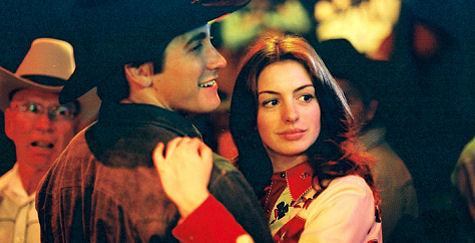
Wells to MST Mario: You contemptible closet-Christian bigot homophobe skeptical Ang Lee-dissing prick!
“Seriously, MST, I hear you and you’ve made some good points, but trust me on these two points: Brokeback Mountain in no way resembles Titanic or Gone With the Wind or anything along those lines. It’s austere, under-stated, and doesn’t try to massage you into feeling anything. Secondly and more importantly, it’s not a gay or gay-themed film. It really isn’t, despite what you may be presuming.
“I program a series of fine-film cinema locations here in Melbourne Australia, and last weekend I held the first public screening of Broekback Mountain in Australia as part of a promotional weekend launching a loyalty card. I attended the screening with my partner after having watched the film at an exhibitor’s screening the week prior.
“I enjoyed the film greatly at the exhib’s screening, perhaps only finding it a little longer than it could have been, but that’s probably my exhibitor’s hat talking. It actually wasn’t until I was driving home that evening that the weight of the film dawned on me and I was left profoundly moved by it. All night I wanted to talk about the film but forbid myself, not wanting to set expectations too high for my partner.
“I agree that the film is certainly worthy of a Best Pic nomination as well as a win, but from where I am standing the U.S. is a very conservative place at the moment and I wonder about the film’s box-office performance there and whether it will get the support it will need from the expanse between the east and west coasts.
“Perhaps the old adage that any publicity is good publicity” stands in this case. Who knows? Maybe if Oprah likes it, it’s in with a chance with the women of middle America.
“What I want to ltell you was that when I was at the screening, I found myself surprised by the reaction it received from the audience. Admittedly the cinema is in a very upscale location in the suburbs of Melbourne and the audience was partially made up of film buffs who jumped on the opportunity to see the film 2 months out from local release.
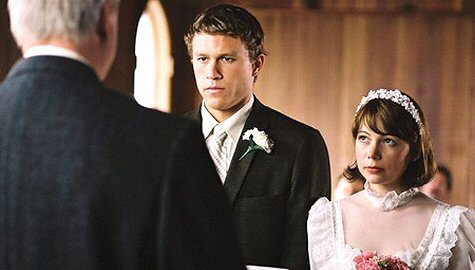
“But there was not a peep from anyone during the film’s more intimate scenes, 80% of the audience sat in their seats during the closing credits and when the film ended I overhead nothing other than quiet comments along the lines of ‘amazing,’ ‘brilliant,’ ‘incredible’ and other assorted superlatives. There were also plenty of tears and gasps during the film’s more shocking moments.
“It’s this reception that has me thinking that regardless of the U.S. reception, the film should find considerable success internationally.” — Kristian Connelly, Film Programmer, Cinema Europa, Traditional & Gold Class Village Cinemas, Australia
“I can understand why you’re on the Brokeback horse, but you better be paying real attention to those snickers in those heartland theaters.
“America is homphobic. To its core. And this is a film — no matter what you feel — about two guys in love. About two guys who have (rather explicit) sex with each other. And no matter how sensitive or how well-made, Brokeback mountain ain’t gonna fly in flyover country.
“And please dump your prejudices and realize that Pride and Prejudice is the kind of lush, middle-brow based-on-a-classic picture that Hollywood just loves to gift with Oscar noms.” — Lewis Beale












